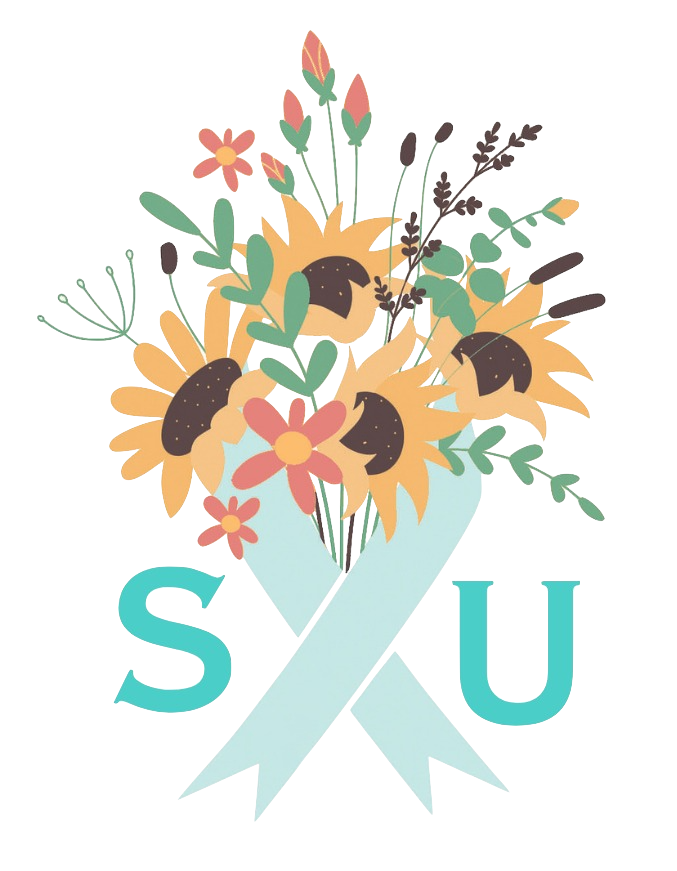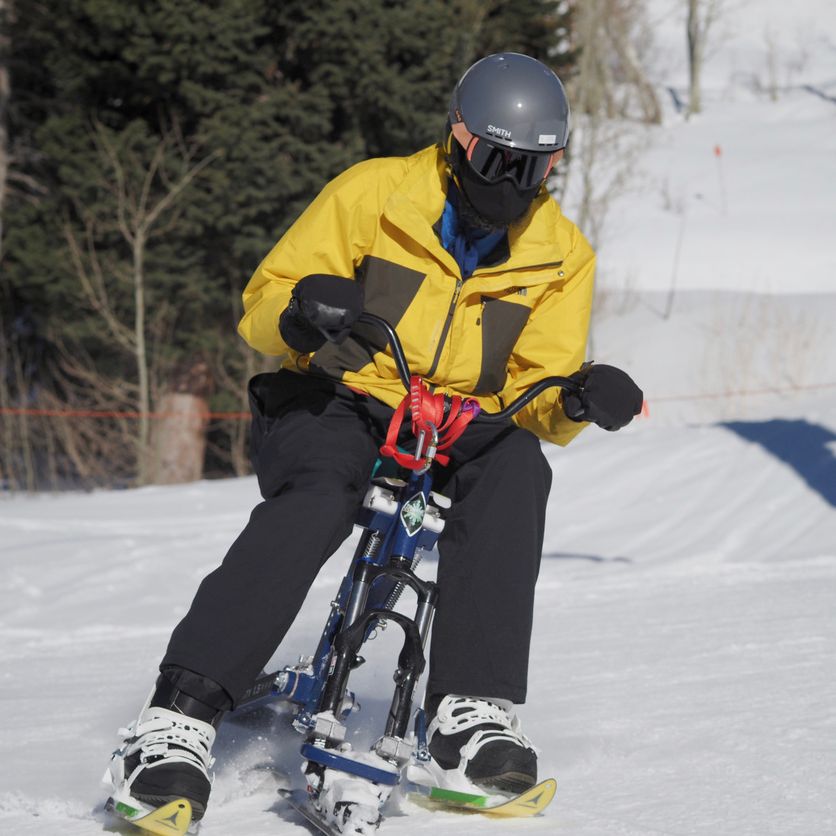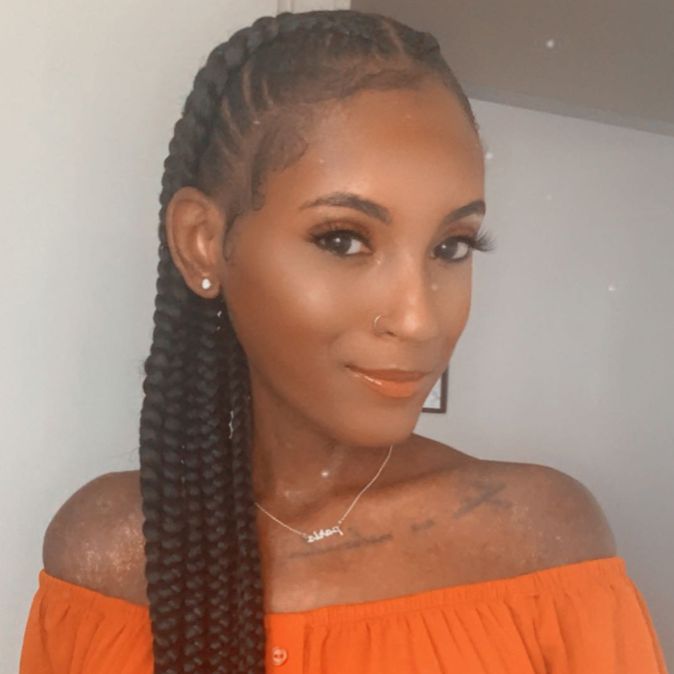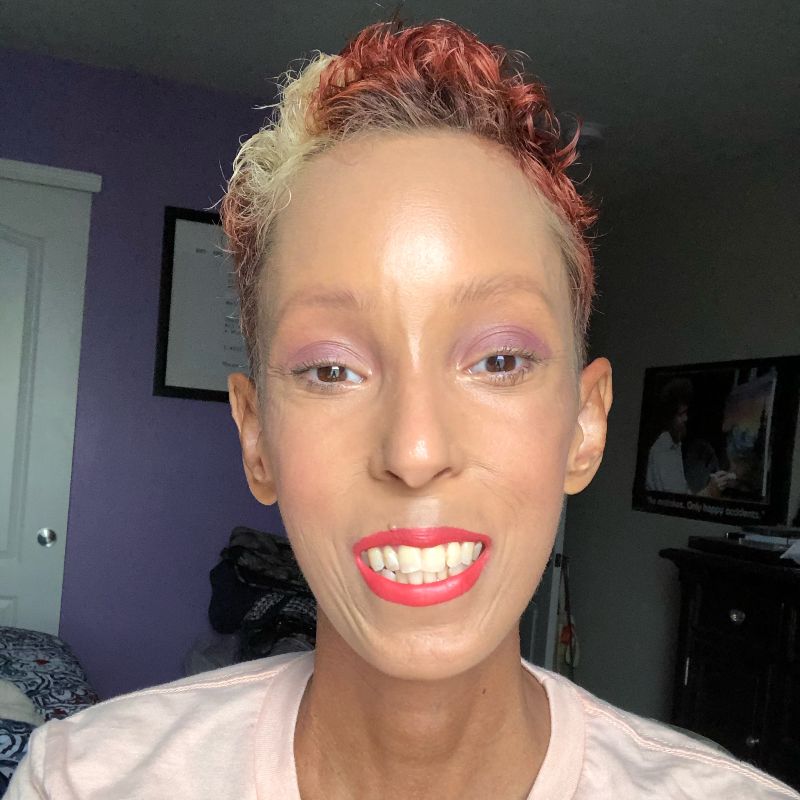Los Angeles, California (United States)
ALEJANDRA SERRANO
Scleroderma Stories Issue 3
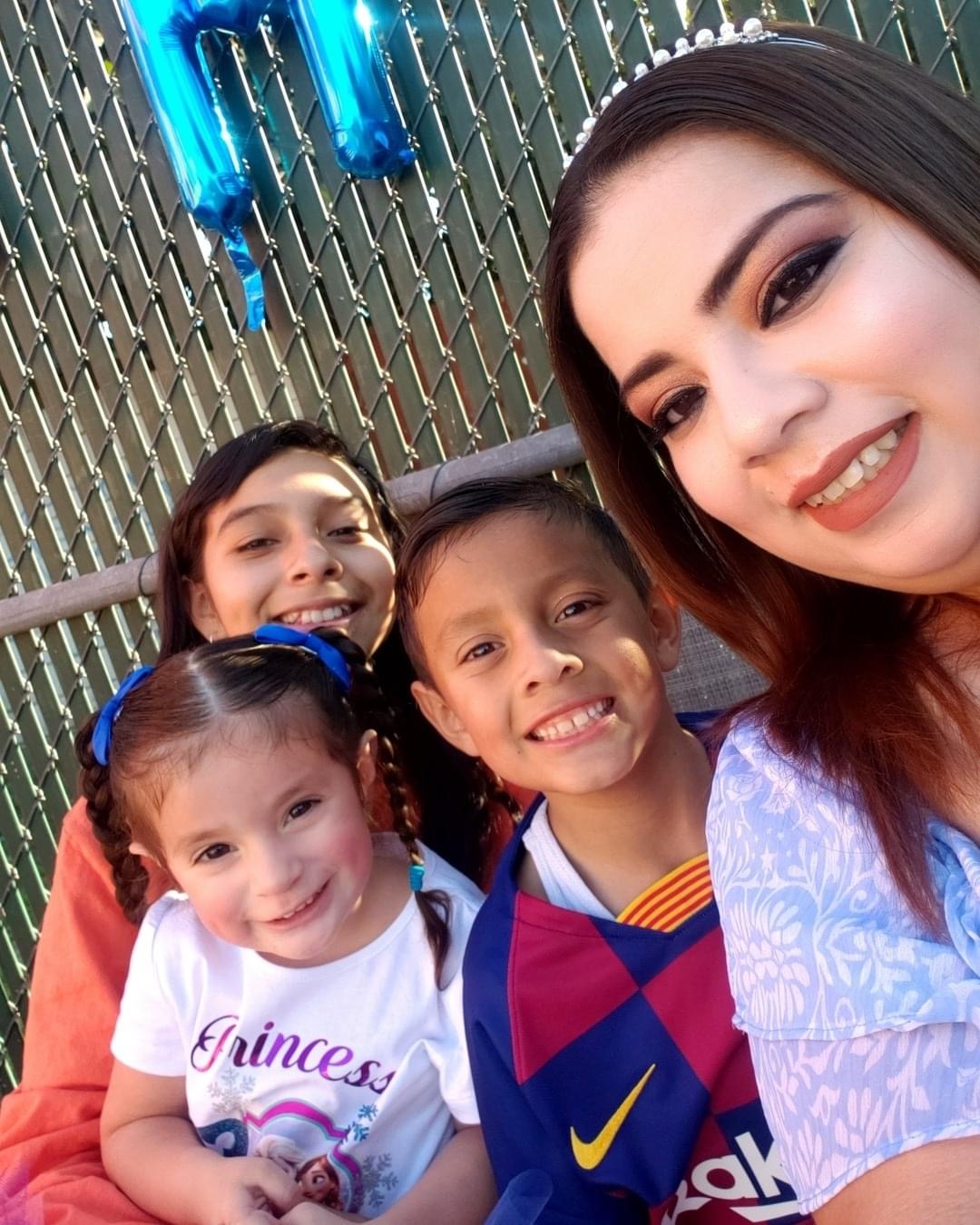
Please introduce yourself
I live in Los Angeles, California. Born and raised. I have been married for three years and been in the relationship for nine. I live with my husband, and I live with my mom. She is my caregiver.
My family is really important to me. They have supported me throughout my whole life. My mom is a single mother, so she has been there for me my whole life. And even when I got diagnosed, she was there when I got diagnosed, and I became her number one priority. So those are the people that, I think everything that I am, I am because of them all.
I was diagnosed with scleroderma in March 2012, and I found out a week before my 19th birthday. I was 18, almost 19, but I had symptoms years before.
What led to your diagnosis?
During summers, I started noticing that I always got really dry skin and red patches all over my face. When I would go to the doctor, they would send me to a dermatologist, and it was always, “Oh, you’re under the sun and you do sports, so that’s why your skin gets really dried. Just remember to always wear sunblock and cover your face.” That was one of my symptoms.
And then growing up, I noticed that I always used to bite myself when I would talk or eat. I would go to the dentist, and the response was just, you’re growing, your teeth are growing. They got to a point where I was bleeding a lot. I went to different dentists, and they told me that two of my teeth that I was supposed to have since I was a little girl didn’t come out. They were barely coming out. And that’s why I was biting myself; they were coming out, and there was no space for them to come out. They decided to open my gums. It was supposed to help, but it did not help. My teeth are still really really small in the back, and I still bite myself when I eat.
When I was in high school, I was really athletic. I used to walk, run, I was into soccer a lot, so I picked soccer. After high school, I went to college. At my college, there were two big hills before you would get to campus. I started noticing that I could not walk those hills. I was short of breath. I also started noticing that I was getting a lot of pain in my legs. My feet were getting swollen, and I wouldn’t understand why. I went to the doctor but didn’t get any answers that were right. But I do remember, growing up, I had a lot of leg pains. It was always, “You have growing pains.” It always looked to me that they were growing pains.
Then the last symptom that I got was a year before, which was when I was in high school. It was my senior year. My right hand would get really swollen, and I started noticing that my hand was getting hurtful. I couldn’t take the pain, and I couldn’t do anything. My mom took me once to the emergency room, and they told me that I’d probably hurt myself or fell on it. I knew I didn’t. That first time, they put me on a splint, and I was okay for about three months.
After three months passed, I noticed that I was getting the same problem in my right hand. I couldn’t move it. It was purple, swollen – the same problem I had three months before. I went back to the emergency room, they put me on half a cast, and it helped for a while. A couple of months later, the same problem happened, and it just didn’t look normal.
My primary doctor decided to test me because he said that there was something wrong. I do have a family history of cancer, so I thought maybe there was something like lung cancer. But it wasn’t. That’s when I got tested for scleroderma, cancer, and lupus. And it came out that I had scleroderma.
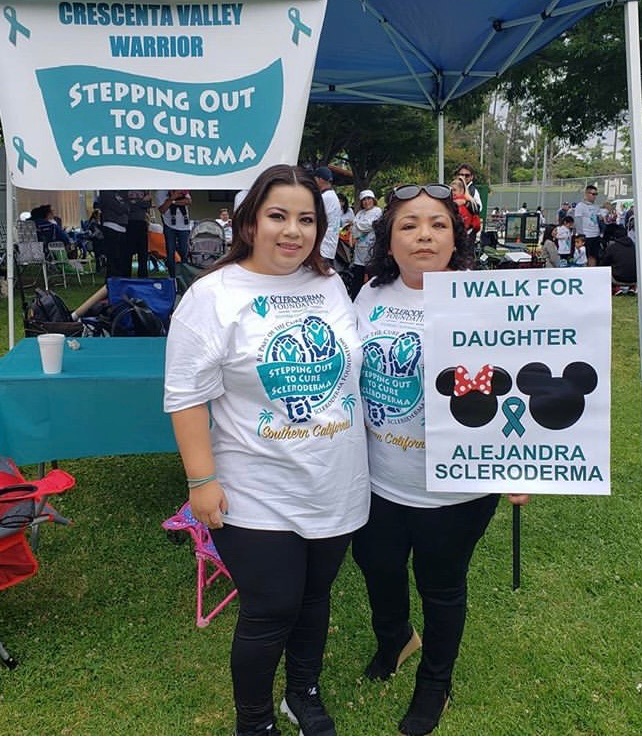
How did you feel when diagnosed?
When I got diagnosed, it was more of a surprise because nobody really knows what scleroderma is. To hear that you have scleroderma and not know what it is, was shocking. I was like, first of all, I don’t know what it is. I don’t know anyone that has scleroderma. “What’s going to happen?” When my primary doctor diagnosed me, he gave me a little card and told me to only google this website and put “scleroderma.”
“Don’t go to anything else because you are going to get scared,” he said. And he said to wait on it. Wait on it until you can’t, which was going to be impossible. I was coming out of the doctor’s, and I googled it already.
Like I said, my mom was there. She was the first person that knew I had scleroderma. I remember we just both really cried because we had no idea what was going to happen. It was more of a shock. I was surprised.
I tried to learn as much as I could that same day, but not immediately. I came home, and on the way home, I was crying. After my mom found out, I told my boyfriend, who’s my husband right now. I told him that I had scleroderma. We both had no idea what it was. I remember I came home, and I was just crying and crying. At that time, I lived with my brother. We all lived in the same house. It was the same thing: nobody knew what it was. They started researching before I did, because I was just completely sad. I was just sad and didn’t want to see anyone.
After a while, when they finally told me that I was going to be okay, that’s when I decided, “Okay, let me look at this website that my doctor gave me to find out what was going to happen.” He did tell me that I had to go see a rheumatologist, so I knew that was my second step.
What other symptoms have you developed since your diagnosis?
I have a lot of problems with my stomach. I get full really fast. My major problem right now is my stomach.
I also developed high blood pressure. I think it happened because, when I got diagnosed, they put me on prednisone. I was on a very high dose of prednisone, and I gained weight really fast. It was in a matter of five months that I gained about 40 to 50 pounds.
The hardest symptom to deal with is my right hand. I write with my right hand and do everything with my right hand. There was a time of my life in that I couldn’t even hold a cup of water, I couldn’t hold a fork, I couldn’t brush my hair or brush my teeth. So, I think my hand is what really affected me.
How has scleroderma impacted your daily life?
I think it all depends on how I’m feeling that day. With scleroderma, it’s a rollercoaster. So you have your good, your bad. Sometimes you can be doing really well in the morning and plan something for the afternoon, and you can get sick and your plans will be canceled.
It’s really hard for me to plan something because I don’t know if I’m going to be able to do it. I’m a big planner, and I’ve always been my whole life. With scleroderma, I learned that I cannot plan things for the future – not even a year, not even six months. Scleroderma affected me in that I can’t make my plans like before. I just try to live day by day and depend on how I’m feeling that day, in that moment, if I have to do anything.
What is the scariest or hardest part of living with scleroderma?
I think it’s not knowing what’s going to happen next. Like I said, I have my days where I wake up feeling really good and plan to do something, and I won’t be able to do it because I will get sick. Or I have my days where I don’t want to get out of bed, and I take my medication, and I’ll be able to do whatever things I have to do.
What are your hobbies or interests?
I love sports, especially soccer. I grew up seeing soccer. My brother played soccer his whole life, and then there was a part of my life that I played soccer. I’m a big Disney fan as well. I love seeing all the Disney movies, and I have a big Mickey and Minnie collection. Everything I have is Mickey and Minnie.
One of my goals in life has always been to help people. When I got diagnosed, I thought that all just went away because I wasn’t going to be able to go to college to accomplish my goal. I always thought that that goal was just gone. But when this whole pandemic started, I decided to open my own YouTube channel, “Alejandra Warrior.”
I just decided to start recording things that I have been through in the past so people can see, okay, I made these mistakes in the past because I did not know. And if you have already been diagnosed with scleroderma, don’t make the same mistakes that I did. They were really hard. I made really bad decisions in the beginning, and I want to help people not make the same mistakes that I did. That’s something that I’ve been doing lately, just recording my life.
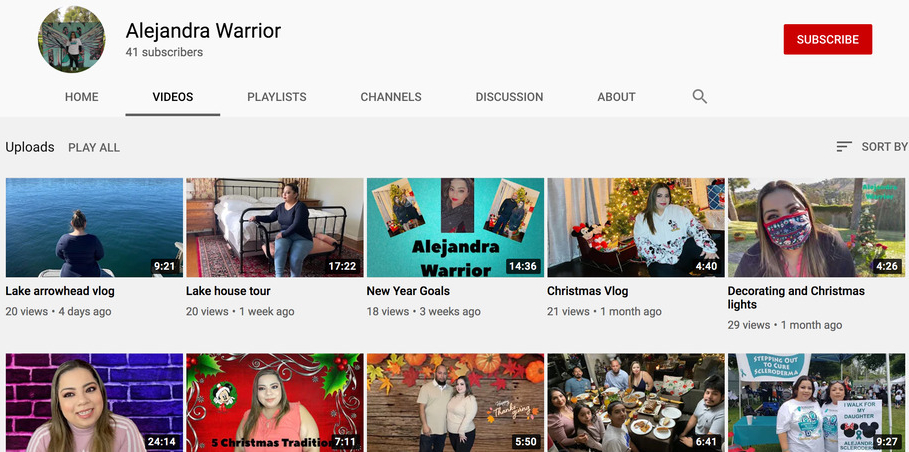
What medications do you take?
I’m taking prednisone. Lisinopril for my high blood pressure, then I’m taking diclofenac for my stomach. For migraines, Sumatriptan. I’ve got quite a lot of medication. Then I’ve also been taking famotidine, escitalopram, and tramadol.
How do you feel about all of the medications that you need to take?
In the beginning, it was really hard. I mean, you go from taking no medication to taking 10 pills a day. The best thing I did was I downloaded an app on my phone that would remind me of every medication that I had to take throughout the day. I still have it on my phone.
I would have an alarm for every medication that I have to take. And if I had to take certain medications with food, I would put, half an hour before, a reminder to eat before I take my medication.
It’s actually really hard even just to remember to take medication. I mean, my memory is really bad. I also don’t want to have all my medication just laying out in my room because I don’t want to see my medication, so I have them in a cabinet. So it’ll be really hard to remember, “Oh,” you know, “I have to take it,” if I don’t see them. Best way: download an app, set your alarm, and that’s how I do it.
Do you have a favorite or least favorite medication?
I have a love and hate relationship with the medication prednisone. When I started prednisone, I was on a really high dose, and I gained so much weight. But it does work for me. It helps me with my pain and my inflammation. I’ve been taking prednisone for about eight years now, since I was diagnosed.
Recently, my doctor and I had a plan for me to go lower on the medication. When I started going to the low dose, I started noticing that I was getting the symptoms back again – the pain, the inflammation, and numbness on my finger. So I will go up. I think that’s the medication that I love, but I also hate it because it makes me gain weight.
Have you done any treatments besides taking medications?
Recently, this year, I started doing Rituxan infusions. I did it for the first time in June. I went to the clinic, they sat me down and took all my vitals, then they put a needle in my veins, and the infusion went straight to my vein. It took about eight to nine hours because I had a bad reaction in the beginning. It was going the way it normally does, but I couldn’t handle it. They had to go slower.
I’ve only done two rounds of Rituxan. My doctor told me that I have to do four rounds. I will do my second session in December to do the two that I have left. From there, I will get tested again to see if it’s working. But I think, I feel – or maybe it’s just because I believe – that it’s working on me. So I think it is.
I have also taken methotrexate. I used to take eight pills at a time, once a week. Then the pills were not working on me anymore, so I started going to get injections. I did that for a couple of years, but then after I changed doctors, the doctor noticed that it wasn’t working on me. So I haven’t taken methotrexate anymore.
I also get injections. I got epidural injections back in November. I also get injections on both my wrist and my hands. Cortisone, I believe.
Do you have a lot of medical expenses?
Yes. I’m on Medi-Cal right now. I just struggle with Medi-Cal because they don’t want to approve a lot of treatments or tests that I have to get done.
One of my problems is that, when you have to get just a test done, they have to approve it. My doctor has to send all the paperwork necessary for me to get approved. Or starting medications, too. For example, tramadol is a pain medication, but it’s a really strong medication that they don’t want to really approve. I will get probably seven pills a week instead of getting the 30 pills that I need for the month. That’s one of the struggles that I have with Medi-Cal.
Other than the medication that my doctor prescribes that has to go through a pharmacy, he also gives me medication that is over the counter to help me. So I have to pay for that medication now. Another thing that I had to pay for was the Rituxan infusions, and that’s really expensive.
I asked another nonprofit foundation to see if they would help me pay for at least half of my Rituxan infusion treatment. I went through paperwork, interview, and the whole process. But they did accept, so they will be helping pay for my medication.
Financially, how do you feel about the future?
It’s hard. I don’t know what can happen in the future. Even next year, I don’t know if I’ll be doing the Rituxan infusion again. And I don’t know if this nonprofit organization is going to help me pay half, like they did right now. That’s one of the things that really stresses me out. When I know that I have to do certain treatments or certain tests, and it doesn’t get covered, because I need them.
But I do have a great support system. My husband and my mom always tell me, “Don’t worry. We will figure it out.” And my brother as well. My brother has helped me so much financially. I’m really thankful that I have them in my life to take that stress away from me because stress can affect my scleroderma a lot.
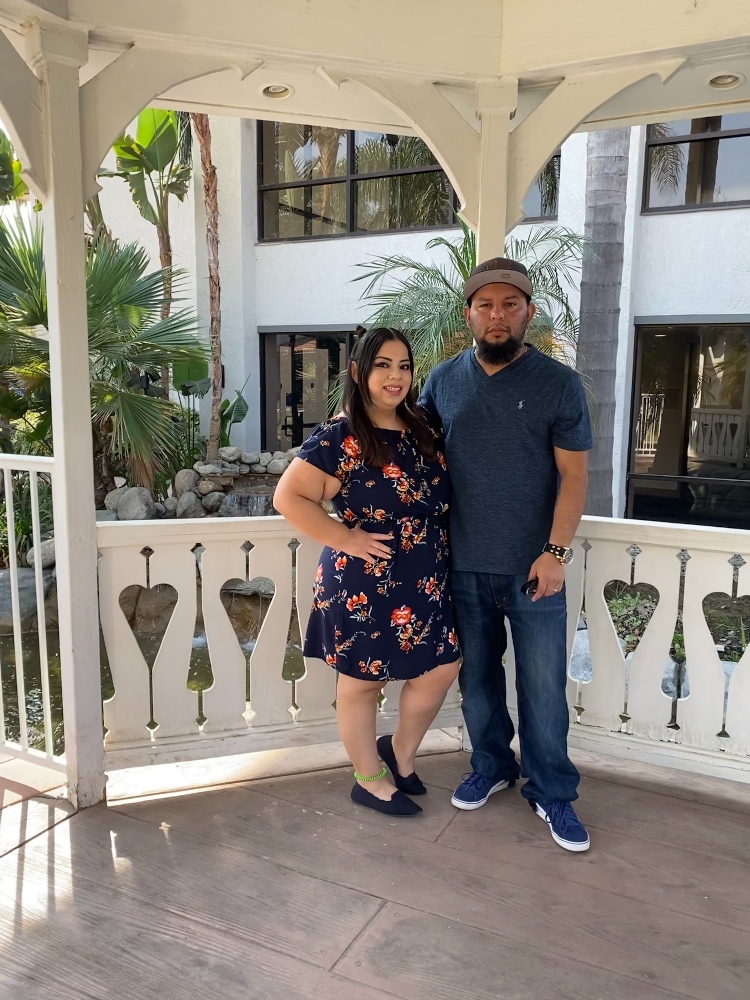
How has scleroderma affected your ability to work or go to school?
I don’t work. I haven’t worked. When I got diagnosed, I was attending college. That first year of college was the first year that I was getting more symptoms, and I was getting tested and starting my medications. That first year was really hard for me.
After that, I decided that I was going to stop going to college because I think it’s more important for me to focus on my health than a career. I have tried a couple of times to go back, but with my hands always giving me more problems, even being online was hard for me. I decided that, for now, I’m going to leave college to the side. Maybe in the future I will go.
When I noticed that I wasn’t going to college and I wasn’t working, and I needed to do something to keep me more busy, I got involved in the Scleroderma Foundation, the Southern California Chapter. From there, I started attending support groups. I am now a support group leader. That’s what’s keeping me busy right now, especially with this pandemic that we’re going through. Everything is via Zoom or email.
How has the pandemic impacted you?
Everything is so different, especially because my immune system is really low because of certain medications that I’m taking. Going to the doctor’s was really scary for me.
I felt comfortable going to my rheumatologist because he is a specialist on scleroderma. I knew that he was going to keep all his patients safe. And he did. I go to my appointment, and he checks my temperature and makes sure that we’re wearing masks. He also has a mask, hand sanitizer, and everything, so I feel comfortable going to him. But I also have to go to pain management, and that’s in a hospital.
It’s very hard for me to go to a hospital, to my doctor’s appointment, because there are a lot of people there. I have to talk to the nurses and say to them that I have scleroderma, explain that my immune system is really low, and ask if there is any way I can either stay in the car until I get called in or go in a room and not be close to anyone.
Have you missed any particularly memorable events or moments because of your scleroderma?
Oh, a lot. I missed a lot of things. But not something that’s specific, no. I miss events with family or parties with friends and stuff like that, but nothing very important. Even if I don’t feel good, if I can’t walk for example, I would just fall on my wheelchair. I tend to try to enjoy myself, even though I don’t feel good.
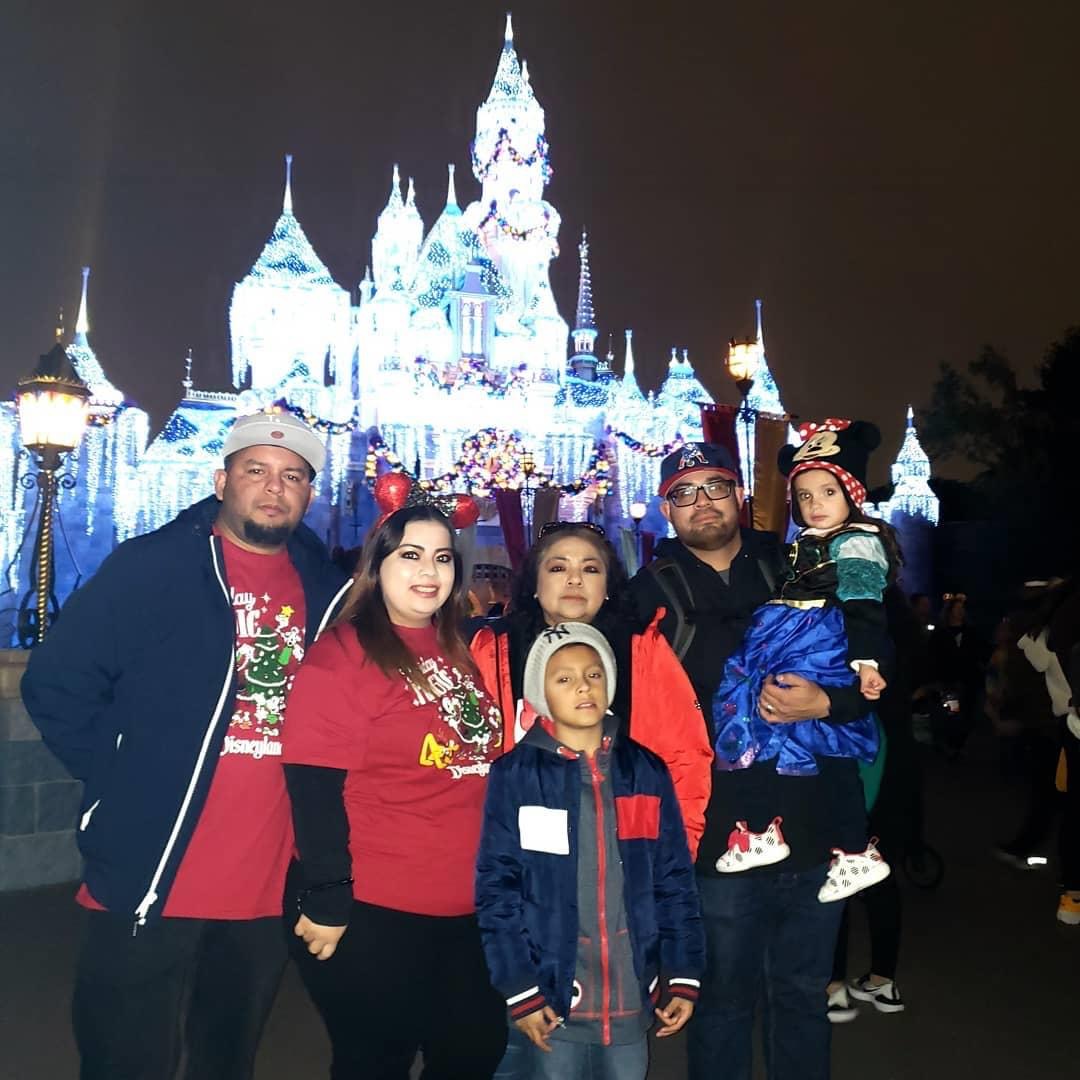
How else has scleroderma changed your life?
My physical appearance changed a lot. I gained so much weight, and I keep gaining weight.
I had a lot of, and I still have, problems with my legs, so it’s really hard for me todo a lot of exercise. Instead of doing an hour on the bicycle, I would start with 10 or 15 minutes because I can’t overdo myself. I can’t do the same exercise thatI used to do before.
I still go out with family and friends, but I won’t do what they do. For example, if they go bowling, I will still go and have fun, but I will not play because obviously I can’t hold the ball.
How have your family and friends supported you?
I am really close with my whole family. When I found out that I had scleroderma, I told my whole family that I have scleroderma. It was on the first day that they knew I had scleroderma. They have supported me, always making sure that I’m okay. If I need anything, they will help me. When I started attending the events for the Scleroderma Foundation (the walk and other events), they have been there supporting me.
My friends as well. I made more friends after being diagnosed, and, as well, they have supported me. They understand what I’m going through. For example, they know I can’t go to the beach because I can’t be under the sun. If they want to go to the beach, they will make sure that we have tents and make sure that I’m okay. That’s a good thing about my family and friends. They will change whatever they have to do to make me feel more comfortable and safe.
My mom has been there since the beginning, so my mom’s still the one that takes me to most of my doctor’s appointments. She’s gone to all my support groups, even before I became a leader. Anything that I get involved with, she’s my number one fan.
My husband as well has been there since the beginning. Both of them, either one or the other, take me to doctor’s appointments. If we have to go to seminars, I will go with my husband. Events that we have, my whole family goes and supports me. If my husband sees any posts of anything related to scleroderma, he will tell me, “Hey, this is what I read” or “We should do this.”
They have helped me so much. The rest of my family as well, always supporting me. If they see videos about someone talking about scleroderma, they will send them to me so I can look at them. They also will go research the foundation to see what’s new. Or if they have speakers, they will listen to the speaker so they can learn more about scleroderma or other things related to scleroderma.
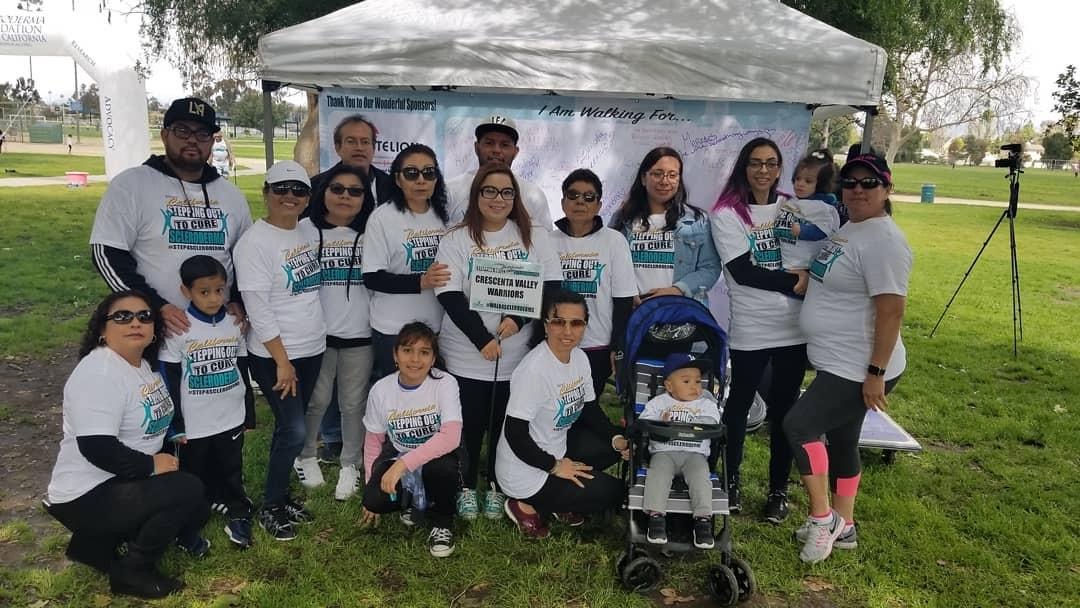
When did you first meet another person with scleroderma?
I met the first person five years into my diagnosis because I didn’t try to reach out, since I was more scared. I was more focused on me getting better than me meeting other people with scleroderma.
After five years of being diagnosed with scleroderma, I noticed that the doctor that I had wasn’t helping me, and I was not comfortable anymore with that doctor. I googled scleroderma, and the Southern California Scleroderma Foundation Chapter came up. I emailed them, and they contacted me back. They told me about the support groups. I went to my first support group, which was Crescenta Valley, and that’s where I met everyone.
Now, I am a support group leader for Crescenta Valley. I’ve been a support group leader for about two years now. Everybody that attends has scleroderma, but there are certain people that don’t have, for example, spouse, family or friends. Anyone is welcome to come. Usually, meetings are about two hours long. We start by talking about how everyone is feeling. Then we share if there’s any new information because we meet every two months. After that, I will give an update about certain events that we’re having. If we have a presentation, then the presentation will happen. If not, we just talk amongst each other, and those are our two hours.
What is it like to be around other people living with scleroderma?
It’s really good. When I attended my support group, the people in that support group had been diagnosed for 20, 30, 40 years.
When I saw that, it gave me hope. I felt that, if they have lived their life, 30, 40 years with scleroderma, then I can do it as well. It helped me a lot. It made me happy seeing other people because it gave me hope that, yes, I have scleroderma, but if I fight, I can still live my life, like a regular person.
How do you get through difficult times?
I think it’s just my faith. I pray a lot. That’s something that I have been doing my whole life. After I got diagnosed, it became a part of me. I remember in the beginning, I would get a lot of pain. I still do up to this day, but now I know how to control my emotions and my pain more. I know how to control it more than I did in the beginning. Something that I always did was just pray and have faith that I’m going to be okay.
I have nieces and nephews, and they’re also my motivation. I always say that I want to see them grow up, and I have to get better.
My husband as well is always supporting me, helping me, and reminding me that I’m strong and that, whatever I’m going through, it’s going to be okay. That it’s just maybe going to be a couple of hours or a day, and remember that the next day, I’m going to get better. Family helps me a lot.
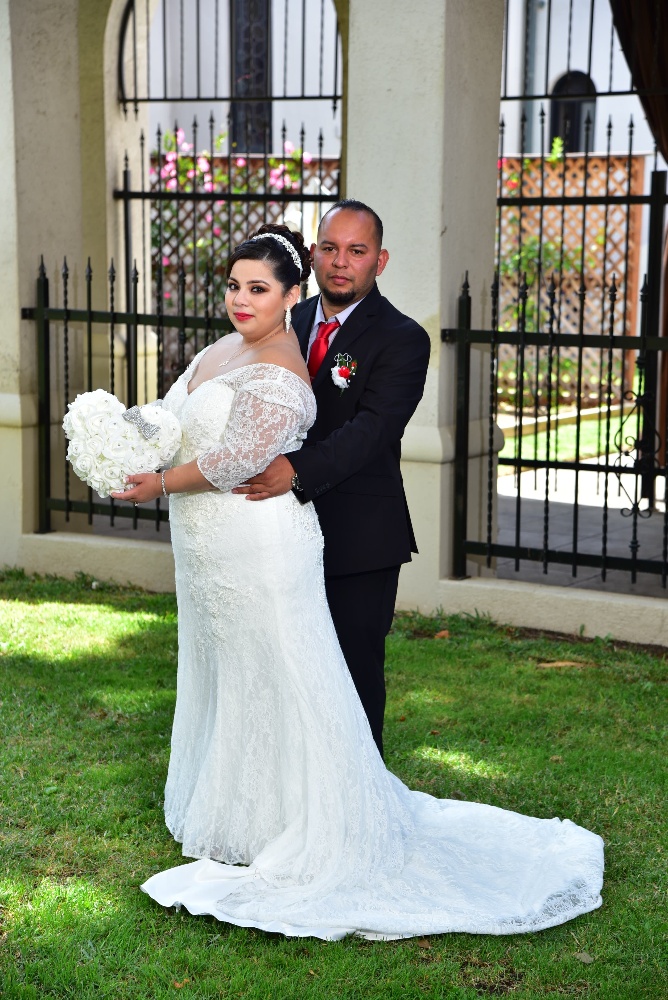
Has having scleroderma changed your mindset or life approach?
I’ve always been a really shy person and a really quiet person. When I got diagnosed, I was the same way.
After a couple of years, I started noticing that I had to stand up for myself and speak out. So it gave me more confidence in myself. It made me stronger. It made me speak up more. And then, I became a support group leader. If I wouldn’t have been diagnosed with scleroderma, I would have never done it because I do not like talking in front of people. Now that I have to do it, I feel comfortable doing it because of how I am right now.
I feel that if I can live my life with scleroderma, I can do anything else. Anything else just seems easy to me now.
What are your goals for the future?
In my personal life, one goal that I want to accomplish – and I think it’s just a dream – is, I want to start my family. I want to have kids. I don’t know if I will be able to, but if I can’t have my own, I want to adopt. I love being around kids, and I always wanted to have kids. I felt by 27, right now, I’d have at least one or two kids, but I don’t.
For scleroderma, one of my goals is spreading awareness about scleroderma. I want everyone in this world to know what scleroderma is. I don’t want to get the same question, “sclero- what?” I don’t want that anymore. I want everyone to know what scleroderma is, like every other chronic disease that everybody knows.
What advice do you have for people with scleroderma or other chronic illnesses?
Stay positive. Yes, you have your bad days. I know they’re really hard, but if you stay positive, and if you have faith, everything’s going to be okay. That’s something that has helped me so much. It’s staying positive and having faith that I’m going to be okay. Like I said, with the Rituxan infusion, is it working? I have no idea. But in my mind and my head and my heart, it’s working.
Stay strong, have faith, and everything is going to be okay.
Be sure to follow us on Instagram and Facebook (@sclerounited) to see more scleroderma warriors’ journeys in our weekly Sclero Sunday series.
Are you a scleroderma warrior? We’d love to interview you for Scleroderma Stories! Please visit tinyurl.com/share-my-sclero-story or email us at contact@sclerounited.us
